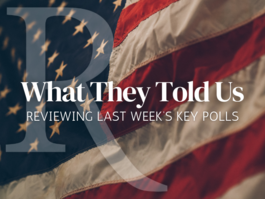Voters Measure Illegal Immigration in Major Crime, More Tax Dollars
Voters tend to view illegal immigrants as the source of more major crime and a big drain on taxpayers’ wallets.

Voters tend to view illegal immigrants as the source of more major crime and a big drain on taxpayers’ wallets.

He's the new Al Sharpton on steroids -- and he's coming to a TV near you.

It sure ain’t pretty, but this is what “post-partisan” politics looks like. And despite all the caterwauling you hear from the political press here in Washington, that is a good thing.
“Ryancare” or “Trumpcare,” or whatever the hell you want to call it, is dead.

The law mandates benefits and offers subsidies to more people. Insurers must cover things like:

The early clashes on Capitol Hill have hurt House Speaker Paul Ryan's popularity and made the Democrats' most visible congressional leader, Senate Majority Leader Charles Schumer, more liked and more disliked.

Confidence that the United States has the edge in the war on terror remains higher than it has been in several years, while concern about the dangers of domestic Islamic terrorism is down.

They still have doubts, but Americans are more confident these days that they aren't being overtaxed.

Did the Freedom Caucus just pull the Republican Party back off the ledge, before it jumped to its death? A case can be made for that.

Thirty-eight percent (38%) of Likely U.S. Voters think the country is heading in the right direction, according to a new Rasmussen Reports national telephone and online survey for the week ending March 23.

In response to the growing economy, the Federal Reserve Board is cautiously raising interest rates for the first time in years. Voters are slightly less wary of the economic power the Fed chairman has, but most still think the Fed is too cozy with big banking interests.

Americans have put the brakes on doing their income taxes after getting off to a record start.

Business executive Donald Trump is used to making decisions. President Trump is learning politics is a more collaborative process.

The rape of a 14-year-old girl in a Maryland suburban high school by two older students who were in this country illegally has moved the sanctuary city debate back on the front burner. Most voters don’t want to live in a community that shields illegal immigrants from the government, and many question the safety of such communities.

Devin Nunes just set the cat down among the pigeons.

While ride-sharing apps like Uber and Lyft are gaining popularity - and notoriety - across the country, the vast majority of Americans say they seldom, if ever, use either service.

In a week chock-full of news, the party that on the night of Nov. 8 found itself, much to its surprise, very much out of power has been having difficulty finding a way to return.

Florida recently proposed a bill that would cut food stamp eligibility for hundreds of thousands of residents, and a sizable number of Americans still agree that food stamps are too easy to come by in the United States.

Americans continue to feel that too many people are getting financial help from the government and that anti-poverty programs just make the problem worse.

On election night in November, exit polls provided the first insight into how different demographic groups voted. But months later, other richer data sets are being released, and they provide researchers with new information about the election and the voters that participated in it. One such tool is the Cooperative Congressional Election Study, which is a large-sample national survey. The preliminary 2016 post-election version of the CCES study came out in early March, and it provides a treasure trove of information.

President Trump is expected to dismantle President Obama’s climate change policies, but most voters already think the government isn't doing enough about the problem.